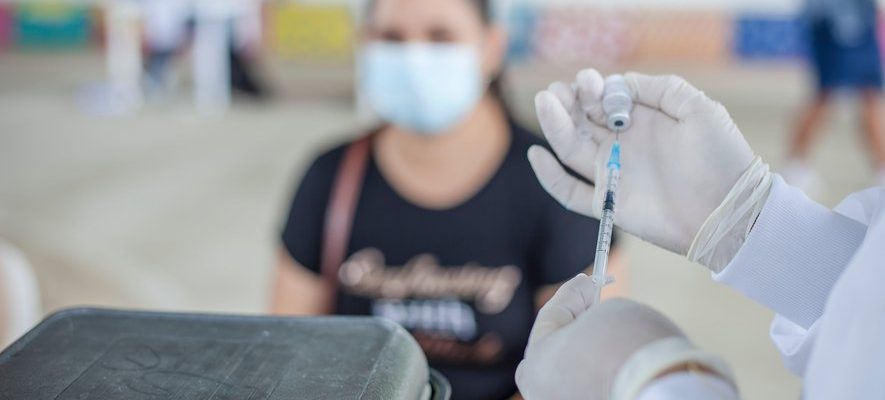It has been three years since vaccination against Covid-19 began in France. Since then, 157 million doses have been injected in the country and 200,000 reports – for potential adverse effects linked to vaccination – have been shared with the various pharmacovigilance centers spread across France. A new study looks at the monitoring of this large-scale vaccination.
Three years of hindsight and a phenomenal amount of data scrutinized: in a study unprecedented in its scale, the French Network of Pharmacovigilance Centers reveals its truths on the potential adverse effects of vaccines used to fight Covid-19. Since the start of the first vaccination campaign against the virus, at the end of 2020, the 30 regional pharmacovigilance centers spread across France have recorded and analyzed post-vaccination reports made by patients and healthcare professionals. For these structures, it is therefore a question of coordinating clinical and epidemiological investigations to find out whether the signals which are emitted are linked or not to vaccination.
Why implement pharmacovigilance?
According to figures shared by the National Agency for the Safety of Medicines and Health Products (ANSM) in June 2023, nearly 157 million doses have been administered in France over the last three years. In parallel, 200,000 reports were sent to the ANSM, without however knowing whether the adverse effects that were observed were attributable to vaccination. 25% of these reports (i.e. 50,000 of them) were classified as “serious”: this therefore concerns 0.03% of the injections carried out in France.
“Monitoring a drug administered in such a short time interval to such a large number of people was completely unprecedented,” comments Dr Aurélie Grandvuillemin, vice-president of the French Network of Pharmacovigilance Centers (RFCRPV) , with our colleagues from Future Sciences. This pharmacovigilance in any case makes it possible to highlight possible adverse effects which would not have been observed during clinical trials preceding the release of these vaccines.
Cases of thrombosis observed?
The French Network of Pharmacovigilance Centers has therefore picked up the thread. Back in spring 2021: cases of thrombosis (formation of small blood clots in the veins) have been reported following certain injections. “We quite quickly sent out a signal on this subject, because we received a certain number of declarations for patients with or without prior risk factors vaccinated by Pfizer, Moderna or AstraZeneca, explains Dr Aurélie Grandvuillemin. So potentially something was happening. thing.”
Read also :
TRUE OR FALSE. Vaccines against Covid-19: is the serum really the cause of “unexplained cardiac arrests”?
The pharmacovigilance centers then launch two epidemiological investigations. These had demonstrated no statistical excess risk for vaccines using messenger RNA technology (Pfizer/BioNtech and Moderna). The statistical signal was, however, confirmed for the AstraZeneca adenovirus vaccine, particularly among those under 55 years of age. The risk of developing thrombosis was estimated at 1 per 100,000 people vaccinated. Health authorities then identified 30 cases of rare thrombosis in France, while 4 million doses of AstraZeneca vaccine had been injected. Nine people died.
Risks of myocarditis and pericarditis?
Also in 2021, reports were shared with pharmacovigilance centers about cases of inflammation of the heart muscle and the membrane that surrounds the heart in several patients who were vaccinated. “Rare but potentially serious” signals of “myocarditis” and “pericarditis” have been detected in some patients who were administered messenger RNA vaccines.
In July 2021, a situation update carried out by the National Agency for the Safety of Medicines and Health Products finally indicated that a signal linked to these adverse effects was “confirmed”, but that it remained “rare” and not questioned “not calling into question the benefit/risk ratio of the vaccine”.
Read also :
DECRYPTION. Covid-19: lots of DNA in vaccines, cases of cancer… Professor Raoult’s untruths put under the microscope
One year later, Health Insurance confirms “that vaccination with Comirnaty (Pfizer-BioNTech) and Spikevax (Moderna) increases the risk of myocarditis and pericarditis in the 7 days following vaccination”, particularly in young men under 30 years old. The health authorities emphasize, however, that the number of cases of myocarditis and pericarditis “appears infrequent in view of the high number of doses administered”.
Menstrual problems after vaccination in women?
This is a potential adverse effect which had aroused the interest of the scientific community at the end of 2021. Almost three years later, a new study carried out by the ANSM showed that the risk of heavy menstrual bleeding is increased by 20% between one to three months after the injection of a first dose of vaccine against Covid-19, using so-called messenger RNA technology.
Read also :
Covid-19: a study confirms the risk of heavy menstrual bleeding linked to vaccination
According to the data that was shared, 8 women were affected per million vaccinated patients. “At the European level, heavy menstrual bleeding was considered as an adverse effect of the mRNA vaccines Comirnaty and Spikevax by the EMA in October 2022 following the evaluation of pharmacovigilance data, in particular those shared by the ANSM. These disorders were then added to the summaries of product characteristics (SmPC) and package inserts for these two vaccines,” explains the study.
Surveillance that continues
The French Network of Regional Pharmacovigilance Centers continues to monitor potential adverse effects caused by vaccination. The organization has listed a number of possible reactions linked to the injection of the vaccines. These can be:
- uncommon (between 1 and 10 cases per 1,000 injections). We can list, among other things, pain in the extremities, insomnia, discomfort, or even lymph node damage.
- rare (between 1 and 10 cases per 10,000 injections). We find urticaria, angioedema or transient facial paralysis.
- very rare (less than one case per 100,000 injections). These include anaphylaxis (a severe allergic reaction).
The authorities, however, are categorical on the subject: vaccination against Covid-19 has saved a large number of lives. In April 2023, a study by the World Health Organization estimated that between December 2020 and April 2023, the vaccine had directly prevented slightly moreone million deaths in Europe96% of which concerned people over 60 years old.

